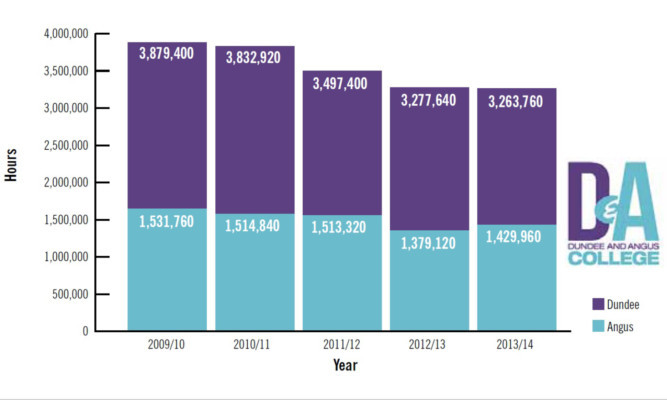Students at Dundee and Angus College have lost out on more than 600,000 teaching hours as government cuts bite.
New figures show that between session 2009/10 and session 2013/14, the number of hours of learning that refer to Dundee have been reduced from 3,879,400 to 3,263,760.
Dundee councillor Lesley Brennan said that the cuts are “reducing investment in the future of Dundee” and making it more difficult for people who want to find jobs to get the skills they require.
Dundee & Angus College principal Christina Potter has rejected Ms Brennan’s claims and says, despite government funding cuts, the college has managed to find “more efficient ways of delivering learning” through the use of “technology, e-learning, shorter teaching sessions, work placements and self-supported study.”
Ms Brennan said: “Reducing investment in the future of Dundee will make it more difficult for those seeking to upgrade their skills for employment.
“While the economic recovery appears to be wavering, this is not the time to reduce the opportunities for those who want to gain the training and the skills that the local economy needs.”
The councillor was responding to figures released by D&A College, which also revealed that in 2011 colleges received, on average, just over £4,000 every year for a full-time student on a non-advanced course.
Angus students have also suffered a drop of more than 100,000 teaching hours since 2009/10 but the 1,429,960 hours provided for 2013/14 are an improvement on the previous year.
Dundee and Angus colleges merged last year and the figures indicated that although less than halfway through the college year, the number of hours of learning provided to each student for 2014/15 was expected to be similar to last year.
Ms Potter said: “Over recent years, colleges have experienced significant cuts in funding whilst the demand for places has not reduced. We have therefore had to find more efficient ways of delivering learning.
“At Dundee & Angus College, we aim to maximise the success of our students, ensuring they are well placed to progress to employment or higher level study.
“The new delivery methods have not adversely affected students’ achievement rates, which continue to rise and remain amongst the highest in the country,” she said.
